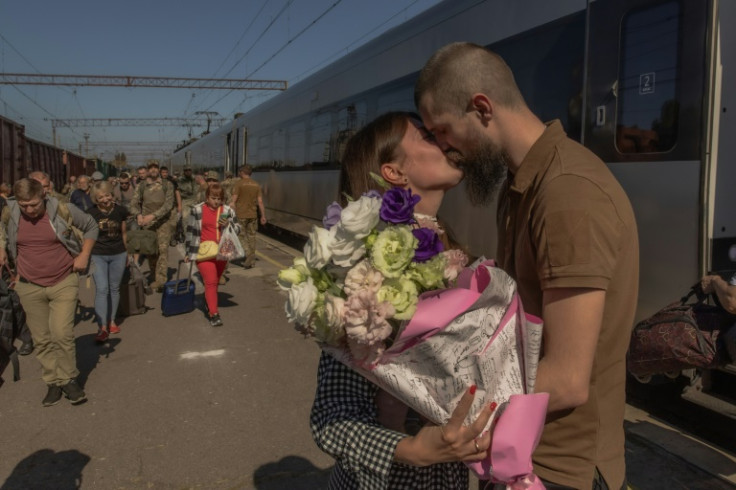Train Platform Of Tears Near Ukraine's Front Line

With a bunch of roses in his hand, Yuriy quickly climbs aboard the train to embrace his wife. She has come from Kyiv to Kramatorsk, near Ukraine's front line.
On platform 4 at Kramatorsk station -- the end of the line for train 712 -- the 56-year-old soldier and his wife Vira, 49, walk in an embrace like two young lovebirds.
Vira boarded the 6:42 am train from the Ukrainian capital, to a city just 25 kilometres (16 miles) from one of the war's most active fronts.
Seven hours later, the couple were united for the first time since the summer.
"I have tears in my eyes... Today is Vira's birthday so it's a gift. Everything is perfect," said Yuriy, who serves with Ukraine's territorial defence forces and was wearing a camouflage cap and uniform.
Like many couples separated by the war who are briefly re-united, the two have rented an apartment in Kramatorsk for the three days of leave he has been given.
"He's just come back from the zero line" -- a term used for the front line, said his wife, who wore beige tracksuit trousers and a polo neck.
Andriy, 36, got off the train alone. His wife saw him off in Kyiv where the two shared a long embrace before he left.
Mobilised in the 66th mechanised brigade, he has just come back from 15 days of holiday. His last leave was in June.
They have a young child and there is no question of his wife coming to Kramatorsk.
"It really is too dangerous," he said.
"I don't know how to measure how difficult it is" being apart, he said.
Several other soldiers get off the train -- many of them from first-class seats. They were returning to the front after short leaves, training or medical care.
The carriages were full, also with civilians making the same journey to visit relatives and friends or tend to the homes they had to leave behind.
After an hour's stop in Kramatorsk, the same train set off again, back to the capital where it arrived at 9:22 pm.
An industrial city and major railway hub, Kramatorsk had 150,000 inhabitants before the war. It is routinely targeted by Russian missile strikes.
On April 8, 2022, a Russian missile hit the station, killing 61 people and injuring 160 -- one of the worst tolls from a single strike in the war.
Platform 4 -- where train 712 arrives -- is now protected on both sides by cargo trains with soil-filled containers.
Under the October sun, 26-year-old Ivan holds his wife Ilona in his arms before she leaves. An infantryman, he has been fighting near Bakhmut for a year.
"Support from a loved one is important. It motivates me even more," he said.
"It doesn't matter how I come back (from the war), without arms, without a leg, mad, I know that she will always be with me," said Ivan, who goes by Vanya and like the other soldiers did not want to give his surname.
Nearby, 34-year-old Sergei, an IT specialist now serving in an assault brigade, hugged his partner Kateryna who could not stop crying before getting on the train.
The pair were together for two days.
The train doors closed and the soldiers stayed on the platform until it departed, blowing kisses to wives and girlfriends.
"I have the impression that when I come to see him, I fly to him with wings. I want to hold him in my arms and never let him leave," said 32-year-old Kateryna, as the train headed back to Kyiv.
"When I have to go, I leave my heart with him so it will always protect him," she said, sobbing.
Alina, 23, only had 24 hours with her boyfriend, a 29-year-old aeronautical engineer.
They have been together for a year.
A medical industry worker, Alina lives in Poltava in central Ukraine -- one of train 712's eight stops.
"I can only come once a month and only for a day. If I could only come for five minutes I would," she said.
"It's as if you get a sweet and then someone immediately takes it away."

© Copyright AFP 2025. All rights reserved.




















